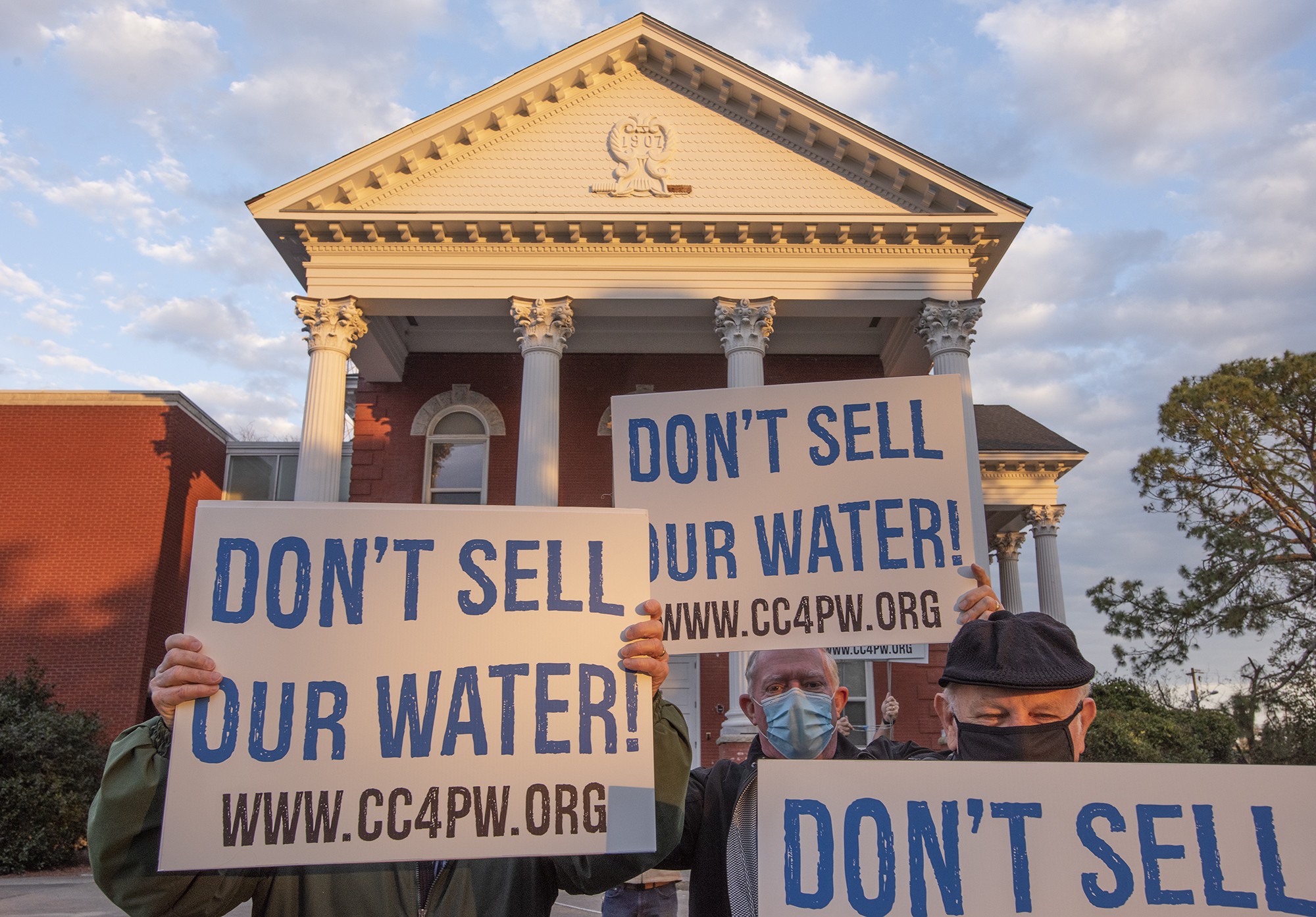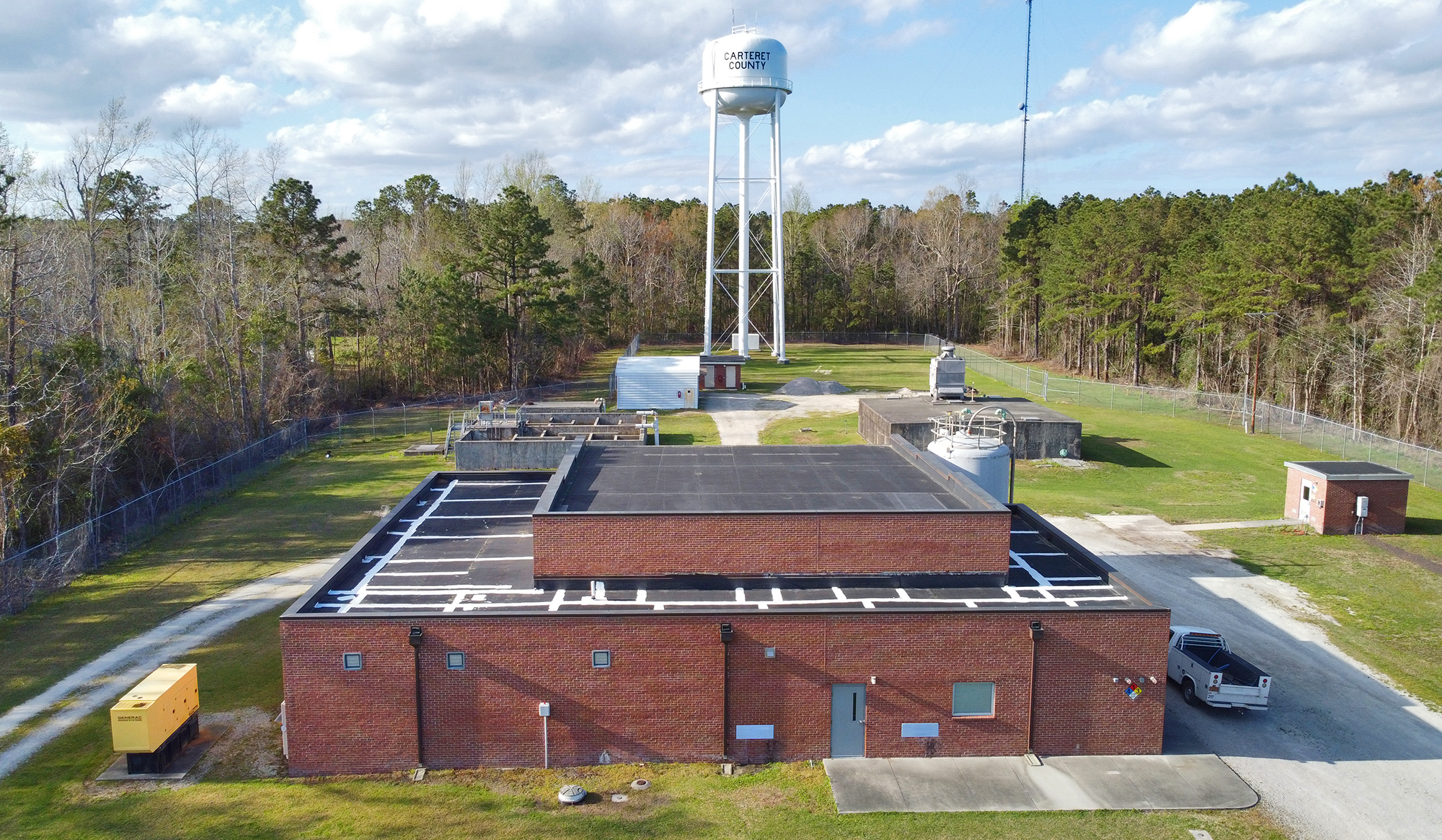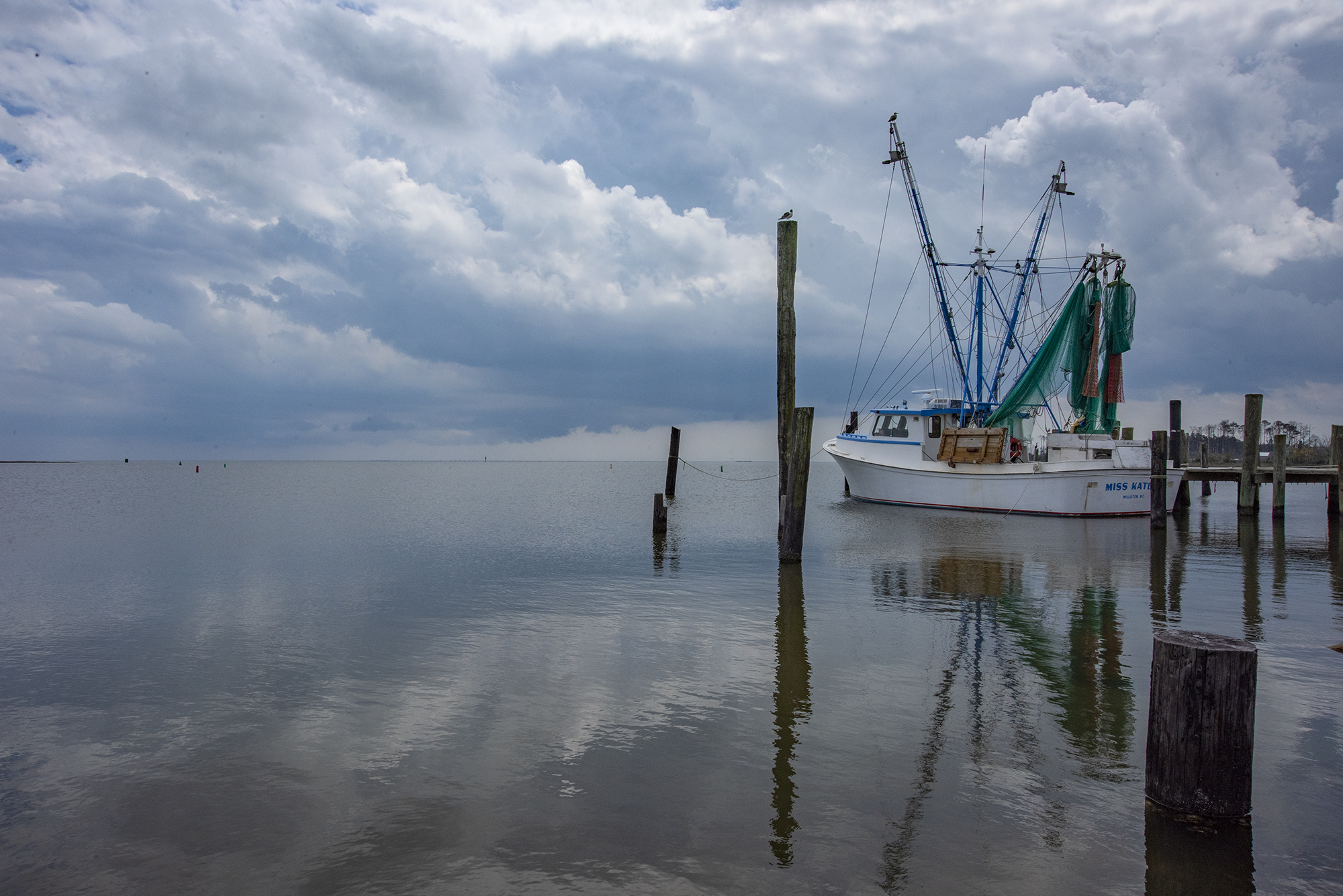
BEAUFORT — Residents who rely on Carteret County’s public water system are putting pressure on commissioners not to sell the system to either of two private companies currently engaged in a bidding war.
Two companies have submitted competing bids for the water system that serves more than 1,200 customers. The Carteret County Board of Commissioners is expected to discuss a potential sale when they meet April 19 in the county administration building in Beaufort. The public will have the opportunity to comment during the meeting and the county manager also plans to provide additional information, County Clerk Rachel Hammer told Coastal Review.
Supporter Spotlight
“No one ever reached out to the public. Shouldn’t we be notified at all?”
Clark Patton, Carteret County water customer
Although a possible merger with Beaufort’s water system had been discussed and declined by the town last year, word of a potential sale to one of two for-profit companies that had submitted unsolicited bids early this year came during the county commissioners’ meeting held Feb. 15, a surprise to many who depend on the system. During the board’s meeting in March, residents spoke out against the potential sale and what they described as a lack of transparency in the matter.
“No one ever reached out to the public. Shouldn’t we be notified at all?” asked Clark Patton of Shell Landing Road, about a mile outside of Beaufort.
Patton said he was one of the first to tap into the county system, which went online more than 15 years ago. He wanted to know why the board was considering selling a system the county valued at $12 million for millions less.
Assistant County Manager Gene Foxworth told Coastal Review that despite what residents had heard, commissioners had not voted to sell the county water system. Rather the unsolicited offers triggered a process defined by state law that is still ongoing.
“Without a special called meeting, which is not currently scheduled, the earliest the commissioners will consider accepting or rejecting offers on the water system would be the April 19 meeting. This is of course assuming the upset bid period has ended because we received no additional bids,” Foxworth said.
Supporter Spotlight
A county board can choose to accept or reject an offer to sell property to the highest bidder, according to state law. A sale must also be approved by the North Carolina Utilities Commission.

Bids, upset bids
Carolina Water Systems Inc. of Charlotte submitted Jan. 13 its unsolicited offer of $4.9 million. Around the same time, Aqua North Carolina, part of a national company based in Pennsylvania that serves more than 3 million water and wastewater customers in eight states, submitted an unsolicited bid of $7 million.
Both bids were presented to the county board of commissioners during its Feb. 15 meeting. The $7 million bid was accepted as the high offer for the upset bid process. The 10-day period for this first upset bid was Feb. 21-March 3.
On March 1, the county received an upset bid of $7.5 million from Carolina Water Systems, prompting yet another 10-day upset bid period.
Carolina Water Systems then submitted March 23 another upset bid of $8.5 million, an offer still well below the system’s $12.3 million value as determined in a December 2019 study on merging the county system with that of Beaufort’s. The county is still in the upset bid process for the system. A public notice was published in the Carteret County News-Times April 4 announcing the 10-day upset bid period.
According to the public notice, the water system is eight parcels or real property totaling about 16.49 acres. There are three elevated water tanks, one ground tank, three booster pump stations, the Laurel Road Water Treatment Plant in Beaufort, the Jonaquin Creek Well House, about 57 miles of water line, 600 valves, 1,206 water meters, 175 fire hydrants. The water lines extend to the Craven County line along N.C. 101 and into the Mill Creek area. Lines also extend from Beaufort town limits along N.C. 70 to East Carteret High School and along Merrimon Road to Laurel Road.
The county also owns and operates Merrimon Water System, a small water system about 20 miles north of the Laurel and Merrimon Road intersection that serves about 30 customers.
Study sparked interest
Foxworth told the board during its meeting Feb. 15 that in 2019, the county received a state grant to study merging the county water system with Beaufort’s system. He said that Beaufort officials, when approached in March 2020, were not interested in a merger.
“I said, ‘you know, well, we’d entertain an offer,’ and by law the statute says that we can receive, solicit or negotiate. So, if somebody brings us an offer, then I have a fiduciary obligation to present that offer to you, whether I think it’s ludicrous or not.”
Tommy Burns, Carteret County Manager
“Subsequently, two private water companies approached us about acquiring the system. That was Carolina Water Systems and Aqua NC. As with any other disposition of property, you all (commissioners) stated your preference for the upset bid process,” Foxworth told the county board in February.
Between June 2020 and January, County Manager Tommy Burns, Foxworth and Rob Wheatly, the county attorney, had multiple conversations with officials of both companies and provided detailed information on the water system, according to a timeline of events provided by the county.
During commissioners’ March 15 meeting, Commissioner Mark Mansfield asked Burns whether the county had solicited bids for the water system.
“We were actually approached by the utility companies,” Burns responded, adding that the companies wanted to know if the county was interested in selling the system. “I said, ‘you know, well, we’d entertain an offer,’ and by law the statute says that we can receive, solicit or negotiate. So, if somebody brings us an offer, then I have a fiduciary obligation to present that offer to you, whether I think it’s ludicrous or not.”
State regulation
Foxworth told Coastal Review that both companies bidding on the water system own and manage numerous systems around the state and are regulated by the North Carolina Utilities Commission. “If the water system were sold to either of them, they would be required to comply with those regulations pertaining to all water systems owned by private utilities.”
Bill Grantmyre is a staff attorney with the Public Staff of the North Carolina Utilities Commission, an independent agency not subject to the supervision, direction, or control of the North Carolina Utilities Commission.
“We represent the using and consuming public, that is the customers, in all cases before the Utilities Commission. We are the consumer advocate,” he told Coastal Review.
Grantmyre explained that statute, GS 62-133.1A, was passed in June 2018 to allow water and wastewater utilities to establish a rate base by using the fair value of the utility property instead of the original cost to acquire an existing water or wastewater system owned by a municipality, county, authority or district.
In December 2019, Aqua North Carolina and Carolina Water Service Inc., of North Carolina – the two companies that bid on the Carteret County system — filed a petition to establish rules on how to implement the statute. The rules were adopted in December 2020.
The fair value for rate-making processes under the statute is the average of three separate appraisals performed by appraisers representing the buyer, the seller and the Public Staff of the Utilities Commission.
“The original source of funding for all or any portions of the water and sewer assets being acquired is not relevant to an evaluation of fair value,” according to the statute.
The application must include copies of the appraisals, any identified deficiencies, a five-year plan for needed infrastructure improvements by the acquiring entity and projected rate impact for the selling entity’s customers for the next five years. The selling utility’s rates shall be the rates charged to the customers of the acquiring public utility until the acquiring public utility’s next general rate case, unless otherwise ordered by the commission for good cause shown, the rules state.
“We wanted the customers to know of a future rate case because the bigger the rate base, the upward pressure on rates. And you don’t want the customers being blindsided by this huge rate increase because it comes two or three years after the acquisition,” he said.
If the application submitted by the utility to the commission meets all the requirements, the commission must issue its final order approving or denying the application within six months of the date the application was filed.
The commission retains authority to set rates for the acquired system in future rate cases. The commission can adjust the fair value as it deems appropriate and in the public interest.
“All this is going to take months because they have to come to some agreement,” Grantmyre said.

Opponents’ concerns
Patton, who spoke at the board’s meeting in March, was one of numerous residents who showed up to object to the proposed sale and was part of a recently formed opposition group called Carteret County for Public Water. The group has published a website and a Facebook page.
Patrick Kelly, who also resides on Shell Landing Road, is an organizer of the group. He told the board that he opposed privatization.
“If you have no competition, you can charge whatever you want. And no one has a choice whether or not they’re going to pay that.”
Patrick Kelly, Carteret County water customer
“I’m not against private companies,” but when it comes to utilities such as water, “if you have no competition, you can charge whatever you want. And no one has a choice whether or not they’re going to pay that or not.” He said he was also concerned about the safety of the water if the utility is sold to a private company.
Later, in an interview with Coastal Review, Kelly said that the group is frustrated with the lack of transparency on the part of county officials.
“We don’t feel like they’re educating themselves enough to make the best decision for the citizens,” he said. “Not a single person that I’ve talked to or who has come forward for (the water system) not to be sold to a private company is asking for this to be subsidized by anybody else. We just don’t want to pay a private company, pay their shareholders, and whatever other profits they need to make. We would rather pay more to the county to make it sustainable.”
Steve Bolding has lived for 10 years in Deerfield Shores, a subdivision outside Beaufort. As a water system customer, he told the board in March that other alternatives should be considered.
“I oppose any municipal water system sale to a for-profit company,” he said.
Michael Dykstra, also a resident of Deerfield Shores, told the board he first heard about this proposed sale on Feb. 24. When he began looking for answers, including if it was for financial reasons, answers were hard to get.
“I believe that it is not in the best interest of the citizens of Carteret County to sell a nonprofit county water system to a for-profit, private company unless there are some really compelling financial reasons that have not yet been explained to the public,” he said. “I’d like to keep it in the county because I think the county people who run it are going to be more responsive to my needs and the needs of the rest of the people than some private company that’s business address is somewhere else.”

Residents paid in
Dee Meshaw, the county finance director, told Coastal Review that the system was built over several years with a combination of funding sources, including a special tax for residents served by county water.
“The capital investment is approximately $12,120,000, and is a combination of grants, loans, local funding such as tap fees and sales tax refunds, and developer paid infrastructure that was donated to the County at project completion,” Meshaw wrote in an email.
In fiscal 2003-05, the county built the first two phases of the water plant and distribution system using about $2.97 million in state grants and revolving loans totaling $3.39 million. Other sources totaled about $152,000 and included state sales tax refunds and tap fees, Meshaw said.
In fiscal 2013 and 2014, the county made a major system improvement with the construction of a water line looping project, and as part of that project, fire hydrants were installed. The improvement was funded by state and U.S. Department of Agriculture grants totaling about $2.19 million, a USDA loan of $1.05 million, and about $144,000 from other sources such as sales tax refunds and water fund reserves, she said.
In addition to their usage costs and property taxes, residents living in areas served by the county system have for years been assessed a special tax to pay for water supply and distribution services. The county established the special tax district in June 2010 and the tax rate in the district has been 5.5 cents since 2012. In addition, sales tax revenues in the district are used to support the water operations.
The special tax fund and sales tax revenues cover the operations of the water system as the county’s only enterprise fund.
The current water system budget is $1.16 million and about 1,205 customers are served by the system.
“The County understands the importance of an increased customer base and will continue efforts to add potential new customers. The County also understands the current system’s infrastructure is aging. It is important that funding start to be accumulated for preventative maintenance and repair of the main water lines,” according to the county’s adopted 2021 budget.







